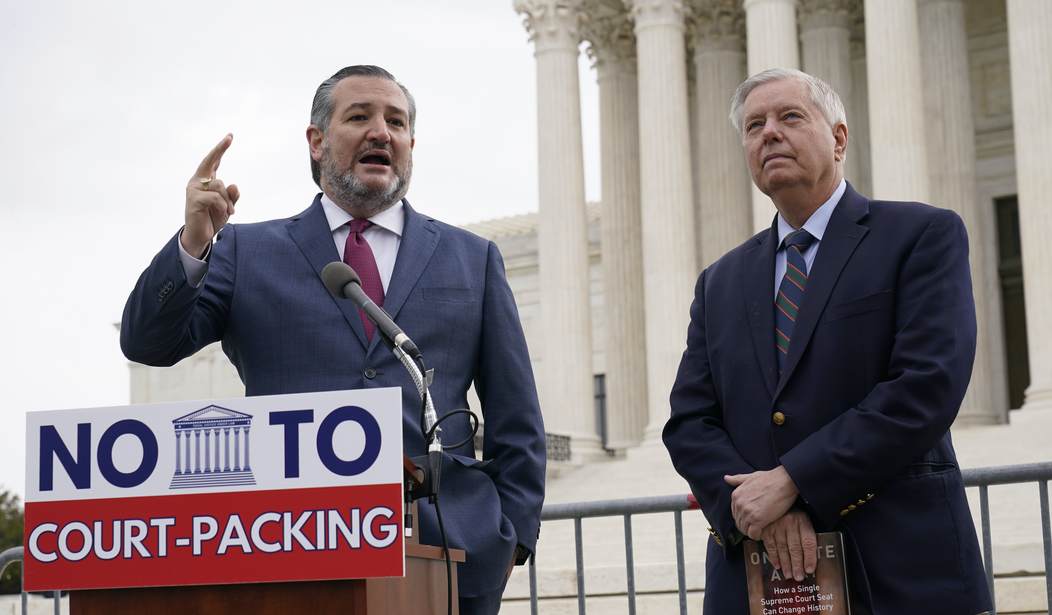“You didn’t see Republicans when we had control of the Senate try to rig the game. You didn’t see us try to pack the court,” Senator Ted Cruz said on April 22. I noted at the time that this statement was indisputable… because it is. Not once when Republicans had the majority did they ever attempt to pack the court.
But, PolitiFact rates Ted Cruz’s claim as false. “Cruz’s comment ignores that Republicans gave diametrically opposite treatment to President Barack Obama’s nomination of Merrick Garland and President Donald Trump’s nomination of Amy Coney Barrett.”
But, neither of those situations were examples of court-packing, which is what Cruz was talking about here. Court-packing is defined by Merriam-Webster as “the act or practice of packing a court and especially the United States Supreme Court by increasing the number of judges or justices in an attempt to change the ideological makeup of the court.” That is the long-accepted definition.
PolitiFact knows this. They tried to get around this by only fact-checking the first part of Cruz’s statement.

Do you see what they did there? Notice how they didn’t include “You didn’t see us try to pack the court” as part of the statement they fact-checked? Never mind the fact that Cruz made the statement from behind a lectern that read “No To Court-Packing.”
Even without that part of the statement, their fact-check doesn’t hold water because denying Garland a hearing or confirming Barrett just weeks before the election isn’t rigging the system either. Even PolitiFact acknowledged that when they had control of the Senate, “Republicans had the right to exercise their power as they saw fit.”
In fact, blocking Garland was justified by a standard established by none other than Joe Biden. In June of 1992, then-Senator Joe Biden was chairman of the Senate Judiciary Committee, and rumors of a pending vacancy on the Supreme Court prompted him to give a speech on the Senate floor arguing that then-president George H.W. Bush shouldn’t attempt to fill a vacancy to the Supreme Court in the middle of an election year. But wait! What about Amy Coney Barrett? She was confirmed in a presidential election year. Well, one caveat to “The Biden Rule” was that the president’s party did not have a majority in the Senate. Prior to the confirmation of Amy Coney Barrett, five Supreme Court vacancies were filled in an election year, and all but one president’s party had a majority in the Senate.
So, Republicans weren’t rigging the system. They were following precedent. In fact, even Biden also found nothing wrong with confirming a Supreme Court nominee in the middle of a presidential election.
“I would go forward with the confirmation process as chairman even a few months before a presidential election,” Biden said in 2016. “If the nominee were chosen with the advice and not merely the consent of the Senate just as the constitution requires.”
“Advice and consent” is the confirmation process. The president has no obligation to choose from an approved list of nominees provided by the minority party, or whatever Biden was implying by “advice and not merely the consent” of the Senate. As noted by the Heritage Foundation, according to the framers of the Constitution, the president “is not obliged to take advice from the Senate on the identity of those he will nominate, nor does the Congress have authority to set qualifications for principal officers.”
Amy Coney Barrett went through the constitutionally mandated process of advice and consent—the process endorsed by Joe Biden in 2016, that as chairman of the Senate Judiciary Committee, he would proceed with a nomination close to a presidential election.
Ted Cruz made his statement in the context of the debate over court-packing. Which, Congress technically has the power to do. If the House and Senate pass legislation increasing the size of the Supreme Court, and it is signed by the president, that would be completely legal. Franklin Delano Roosevelt infamously attempted to pack the Supreme Court in order to ensure his New Deal agenda wouldn’t be struck down by the court. It was politically devastating for him because it was seen as exactly what it was, a blatant power grab, and no president has even tried it since. Though it looks like Biden might.
One could argue that what counts as “rigging” is subjective. And that might be a fair point. Democrats once praised the filibuster as an important device of the minority party, only to go nuclear to prevent the GOP from doing exactly what they did with it. One thing is certain though. PolitiFact deliberately ignored Cruz’s comment about court-packing to make a bogus rating over a subjective assessment of what counts as “rigging the system.”










